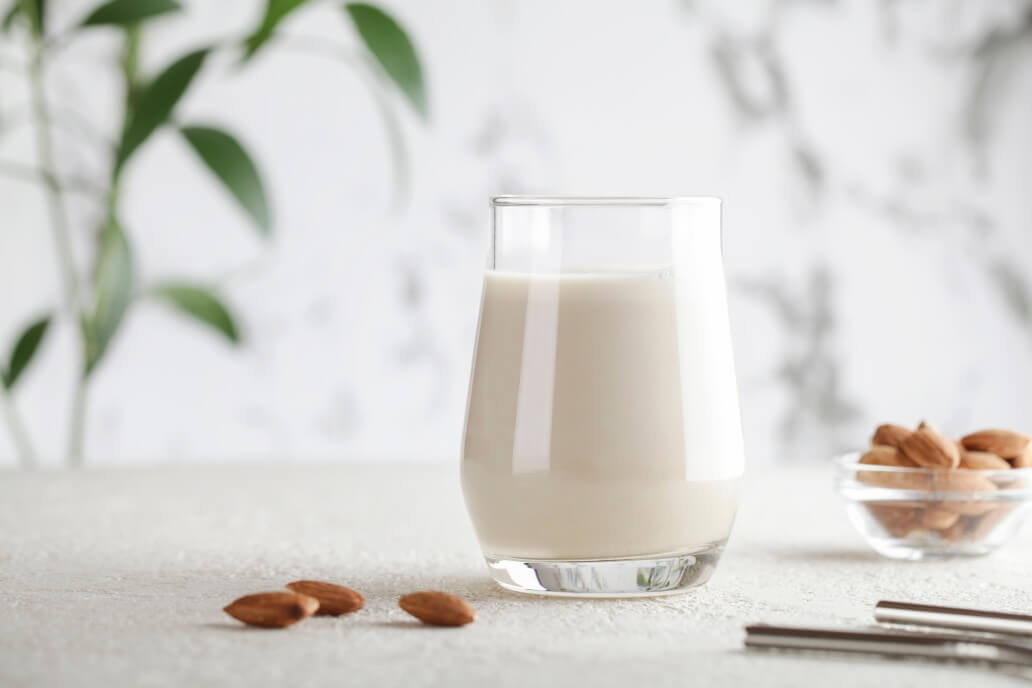If you have recently started drinking almond milk, you may be wondering about the properties this milk has, and whether it is healthy or unhealthy. Is almond milk a source of inflammation, or could it be a cure?
Almond milk may have some ability to reduce inflammation because of its high vitamin E content. Many people drink almond milk for a variety of different reasons, but the vitamins it contains are an attractive aspect of this milk.
Let’s look at almond milk’s properties in more detail and explore whether it has any ability to reduce inflammation, or whether this is a myth.
Does Milk Cause Inflammation?
There has been a great deal of debate about whether dairy milk can cause inflammation and whether it should be cut out of the diet for this reason.
In the past, many people have stopped drinking dairy milk because they fear the inflammation it could cause.
However, a lot of recent studies have indicated that cow’s milk isn’t likely to cause inflammation, and one showed that the high level of vitamin D can help to reduce inflammation.
However, it is true that milk contains saturated fats, and these can worsen inflammation that is already present.
In other words, the saturated fat in milk doesn't cause inflammation, but in cases where it is already present, they may make it worse.
This may be why dairy milk appears to make acne worse at times.
Acne is an inflammatory condition and anecdotal evidence suggests that consuming dairy may increase the symptoms and decrease the body’s ability to recover.
However, there is no evidence to suggest that dairy milk causes acne.
Many people also associate the cramping and bloating that milk can cause with inflammation, but this could be due to undiagnosed lactose intolerance, and may be nothing to do with the fats in milk – but instead related to the sugars.
This confusion has led to a lot of people removing dairy milk from their diets and swapping for plant based milks, believing that these may be healthier.
Overall, however, it seems likely that dairy milk does not contribute anything significant to inflammation.
Related: Does Almond Milk Cause Acne?
Can Almonds Cause Inflammation?
More research is needed to fully understand the relationship between almonds and inflammation, but it is thought that almond consumption can reduce inflammation and oxidative stress.
Almonds are rich in vitamin E, which is an antioxidant that may help to fight inflammation and promote recovery.
Almonds are therefore unlikely to cause inflammation.
It is thought that if you eat a healthy diet, you may be able to reduce your inflammation and oxidative stress simply by including almonds in the diet.
Further research is needed to better understand the link between the food and the inflammation, but overall, it is promising.
It should be noted that eating almonds in excessive quantities is unlikely to be nutritionally beneficial.
Almonds are high in fat (albeit healthy fats) and could lead to weight gain if you eat too many of them.
A small serving of nuts per day is usually considered sufficient for most people.
Eating almonds alone is unlikely to be sufficient to cure inflammation, but they are very unlikely to cause it.
Overall, most people consider almonds a healthy food to include in your diet on a regular basis.

Is Almond Milk Anti-Inflammatory?
Almond milk may be anti-inflammatory because it still contains the high levels of vitamin E that are thought to make almonds themselves anti-inflammatory.
Processing the nuts into milk does not significantly affect the vitamin E content, so drinking almond milk should be as beneficial for getting a regular dose of vitamin E as simply eating the almonds.
Plus, some commercial almond milk is fortified with additional vitamins to increase the nutritional profile even more.
Vitamin E works as an antioxidant, helping to attack free radicals that may cause inflammation.
Therefore, increasing your consumption of vitamin E could bring down the levels of inflammation in the body.
More research is needed to fully understand the link between almond milk and inflammation, however.
So far, the link has mostly been made with whole, unprocessed almonds.
Although almond milk is thought to be high in vitamin E and therefore able to offer the same benefits, little research has been done on this so far.
The study mentioned above suggests that there are other phytochemicals that are commonly found in plant foods (such as almonds) may offer further health benefits and antioxidizing properties.
However, the same study notes that eating large amounts of vitamin E could be harmful, and says that other studies have found inconsistent results or disappointing outcomes from increasing the consumption of vitamin E.
Further research is needed to get a better understanding of almond milk and its anti-inflammatory benefits.
Generally speaking, almond milk is a healthy substitute for milk, but it's probably not going to "cure" your inflammation.
Related: 10 Health Benefits of Almond Milk
Is Silk Almond Milk Anti-Inflammatory?
Silk almond milk contains some additives that have been shown to inflammatory.

Is Unsweetened Almond Milk Anti-Inflammatory?
If you are going to drink a lot of almond milk, it is certainly better to choose unsweetened.
Unsweetened almond milk doesn't contain additional sweeteners that could contribute to weight gain and other health issues.
Both sweetened and unsweetened versions of almond milk tend to contain high levels of vitamin E and vitamin D.
So, even sweetened almond milk may be able to help with inflammation – but unsweetened is undoubtedly better for you.
This study suggests that sweeteners could contribute to inflammation.
Related: Is Almond Milk Good For Arthritis?
Is Almond Milk Yogurt Anti-Inflammatory?
There is very little information about whether yogurt made from almond milk could have anti-inflammatory properties.
It seems likely that it could, given that it is made using almond milk, and we have established that this could be anti-inflammatory if consumed in healthy quantities.
If your almond milk yogurt contains probiotics, you may get additional anti-inflammatory benefits, as it’s thought that probiotics can help to negate the inflammatory response.
You should therefore try to choose a live almond milk yogurt, rather than one without live cultures.
If you are going to make your own almond milk yogurt, you will likely be using live cultures; make sure that you keep these alive so that you get the benefit of them as you consume the yogurt.
So far, there are no direct studies that show almond milk yogurt can reduce inflammation, but it seems very likely, given the evidence and what is known about live cultures already from studies done on dairy yogurt.

Which Types Of Milk Are Anti-Inflammatory?
Unfortunately, inflammation is a complicated phenomenon, and science does not yet have a full grasp of what causes it and what reduces it.
There is a lot of ongoing debate, and it is likely to depend to some degree on what other foods you eat.
As we’ve also seen with the inclusion of carrageenan, it also depends on what is included in the milk, so make sure you are checking the ingredients before you choose a milk.
However, it seems likely that almond milk, soy milk (study), coconut milk (study), and possibly dairy milk could reduce inflammation within the body if combined with a healthy diet and consumed in the correct quantities.
Related: Almond Milk vs. Soy Milk
Conclusion
Almond milk does appear to offer some anti-inflammatory advantages.
Incorporating unsweetened, carrageenan-free almond milk into your diet on a regular basis may help to reduce inflammation in the body and make you feel healthier.
However, further study is needed to fully understand the connection between almond milk and inflammation.
